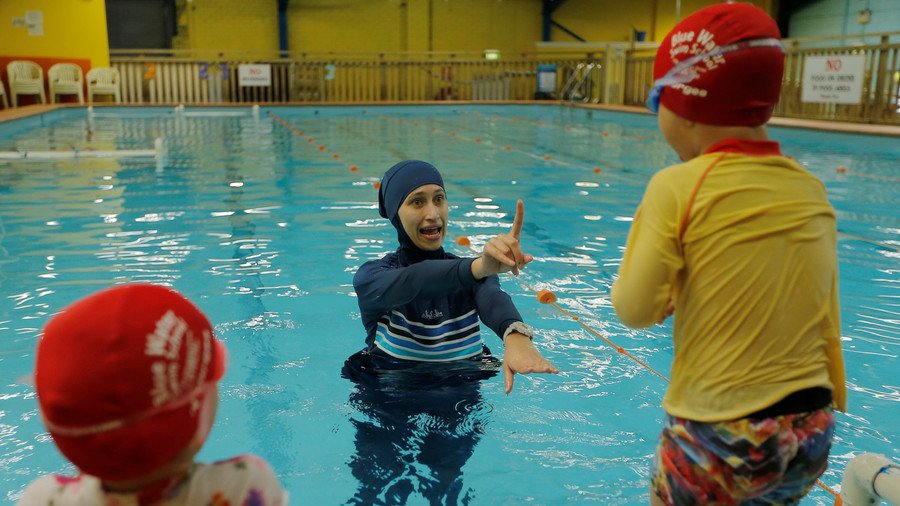The German family affairs minister rekindled the burkini debate when she said wearing a full-body swimsuit during school swim classes is “justifiable.” Despite facing mounting criticism, she maintained the idea was “pragmatic.”
The full-body swimsuits, dubbed burkinis, which cover the whole body apart from the hands, feet and face, could be actually helpful in providing education to Muslim girls, as they actually allow them to take part in the swim classes – something they would otherwise be forbidden to participate in largely due to the religious views of their parents, the Minister for Family Affairs Franziska Giffey told the German Die Zeit daily.
"The most important thing is the well-being of the children and that includes being able to swim," she said, explaining her stance on the issue. The minister then called wearing burkinis during school swim classes “justifiable” and pragmatic, praising an approach taken by one school in Western Germany that bought some 20 burkinis using money from some “private donations” and has been handing them out to its female Muslim pupils since at least 2016, the local media revealed. Some 15 people used the free garments over that period, according to reports.
The practice had provoked brief criticism from the regional authorities. However, the family affairs minister seems to have taken the debate to a new level, as her words provoked a wave of outrage, both from politicians and people on social media.
‘Wrong signal’ & ‘modern family policy turned on its head’
Burkinis cement a “misogynistic understanding in a place where children and teenagers are supposed to learn the opposite,” the German Agriculture Minister Julia Kloeckner said, assailing her fellow cabinet member. North Rhine-Westphalia’s regional integration deputy minister, Serap Gueler, also slammed Giffey’s approach, saying that she sent out "the wrong signal" and adding that her views represent a "misunderstanding of tolerance."
Even Giffey’s predecessor as mayor of Berlin’s borough of Neukoelln, a post she had held before becoming a minister, called her words “nonsense.”“Promoting” an approach which actually involves “total sexualization of women” and projecting this view on girls as young as six or ten years old, “turns any modern family policy on its head,” Neukoelln’s former mayor, Heinz Buschkowsky, who is considered to be Giffey’s political mentor, said, lambasting the minister in a guest piece for the Bild daily.
People on social media seem to be also mostly siding with Giffey’s critics. “Mrs Giffey, integration does not work in such a way! That is the wrong path,” one person wrote in a Twitter post.
“Mrs Giffey, Burkas and burkinis continue to be a symbol of oppression of women in Islam. They are not a part of our culture and prevent any integration. What sort of an education goal do you associate with them? It might be difficult to explain this,” another person wrote on Twitter.
Other people seemed to be more judgmental in their comments. “The family minister sees burkinis for the Muslim women as acceptable. I do not see Giffey as acceptable,” one Twitter post reads. “The family minister wants to allow [wearing] burkinis during the swim classes. What’s next Mrs Giffey? Would child marriages suddenly become a good idea or?” another post rhetorically asks.
Some people, however, appeared to join the minister’s side in this debate. “Giffey is actually right. Burkinis are justifiable. All children learn to swim and there is no reason to ban [girls] wearing burkinis from that,” one person wrote on Twitter, adding that any other decision in such a situation would actually be a “step backwards.”
“I consider such pragmatism to be okay. We should pay more attention to teaching children to swim rather than promote our own ideology,” another person said, adding that there have been enough ideological debates already.
Meanwhile, the head of the German Central Council of Muslims, Aiman Mazyek, denounced the whole issue as a “pseudo debate” that only “further strengthens the right-wingers while drawing attention from the real problems.” He also praised the approach backed by Giffey as a “sensible and pragmatic compromise.”
The widespread public outrage eventually forced Giffey to turn to the social networks to clarify her stance on the issue and actually backtrack on her previous statements. “I want to make it clear: I do not support wearing burkinis during swim classes,” the minister wrote in a Facebook post.
The scandal comes at a time when the German Chancellor Angela Merkel and her Bavarian allies and coalition partners are in a deepened rift over her liberal refugee policy, that has allowed more than a million asylum seekers to enter Germany since 2015.
Horst Seehofer, the German Interior Minister and member of the Bavarian Christian Social Union, has recently reportedly told his closest aides he “cannot work with this woman anymore” in what seemed to be a high-point of the row within the coalition. The two heavyweights of German politics have had their disagreements for quite some time. In particular, they debated whether Islam is “part of German society.”
If you like this story, share it with a friend!



